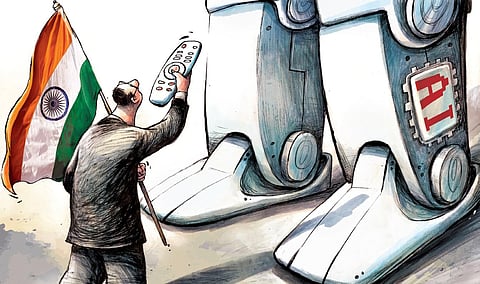

In the demesne of artificial intelligence (AI), nations and people find themselves in perplexing and uncharted domains. As Open AI academics appositely articulated, we are building the plane as it is rolling down the runway.
An analogy is equally prophetic for the entire arena of artificial intelligence. A realm that had beheld an incredible evolution since 2017 when Google Brain published a new deep learning approach entitled the Transformer.
Open AI consequently leveraged the Transformer architecture to design GPT (Generative Pre-Trained Transformer) models, utilising reinforcement learning through human feedback techniques (RLHF). These humongous language simulations have left the world holding its collective breath. Artificial intelligence-driven chatbots, image generators and search engines have swiftly taken over our lives and are technologically transforming ever so rapidly, even today.
Scientists and innovators who work on the cutting edge of technology have called for caution and circumspection or even a temporary hiatus due to the perceived perilous consequences of the unregulated proliferation of Artificial Intelligence.
The European Union, China and the US are all clambering to police this domain, with diverse bodies proposing their unique templates for its governance. The Draft AI Regulation Act of the EU, China’s draft AI regulation and the AI bill conceptualised by the Biden Government are a few of the ingenuous proposals to govern AI.
Other proposals include the OECD AI principles, US Senate Majority Leader Chuck Schumer’s holistic plan for AI regulation, and Rishi Sunak’s aspiration to position Britain as a global vortex for AI through Britain’s AI summit, among others. While no one may have a solution, the world seems dogged in its determination to try and police AI as expeditiously as possible. Three significant issues arise as a consequence of these regulatory efforts:
First, these regulations, whether the Chinese draft AI regulation or the EU’s AI Act, are strictly enforced from the standpoint of risks associated with AI. The digital ministers of the G-7 countries also endorsed a risk-based approach similar to the EU legislation. China additionally is also regulating to ensure that it does not lose control over information. For developing countries, however, an ostensibly benevolent though onerous regulation could stymie Research and Development and innovation in this undulating and unexplored lea. There is the twin imperative of getting people out of poverty while embracing the latest and best AI that the world offers. Else we risk potential monopolisation and exploitation by global tech conglomerates.
The second issue is how AI would be regulated. We are presently seeing several legal frames trying to converge on a common set of principles to regulate a technology that is changing by the day. Washington and Brussels are trying to lay the underpinning for global governance of AI through the bilateral Trade and Technology Council. The United States is also throwing its weight behind the effort to develop a global framework. The concern, however, is that technology is moving faster than regulation; a novel example of this is that when the EU draft AI Act was designed, there was no generative AI or large language models (LLMs). Now they have to go back to the drawing table to draft a law that incorporates harms associated with LLMs.
Third, the breadth of US-China contentiousness adds another layer of complexity to AI regulation. Economic and technological decoupling, along with AI’s increasing role in decision-making processes within war rooms and diplomatic chanceries around the world, accentuates the strategic implications of AI.
AI is already omnipresent in situation rooms in the US, with entities like Rhombus Power accurately predicting political instability in Sri Lanka, Chinese activities in Kiribati and the Solomon Islands, and even the Russian invasion of Ukraine well in advance. (They used satellite data, missile sites and local business transactions of Russian soldiers to predict that a war was coming way back in October 2021).
There are also challenges of AI hallucinating technologies being deployed in deepfakes and extreme weaponisation of information to generate negative externalities in society.
In the realm of technology, the ubiquitous Amara’s law, coined by Stanford Computer scientist Roy Amara, reminds us of a fundamental truth: “We overestimate the impact of technology in the short-term and underestimate its effect in the long run.” India seems to be capitulating to this configuration of thought.
Instead of placing guardrails against AI and overestimating its existential threat to humanity in the short term, India needs to focus on developing an AI model that fosters innovation and empowers citizens.
An Artificial Intelligence ecosystem that can help in the early detection and affordable treatment of diseases, that digitises the agricultural space managing the entire ecosystem from sowing to selling the produce, that develops voice assistants and speech analytics products for multiple languages, that provides affordable credit and financial solutions, and most germane, uses data to endow people with opportunities that enable them to participate in the marketplace, thereby ensuring protection and privacy.
The United States Land Grant Act of 1862 or the Morills Act donated land to each state to establish colleges. These colleges provided instruction in agriculture, military tactics, the mechanic arts and classical studies. Today, there are more than 100 land-grant institutions in the United States and its territories, each focusing on teaching, research and outreach. The Act essentially took new knowledge to the people and provided a way for the industrial class to achieve liberal education. Many would say it transformed the United States into what we see today as a global hegemon culturally, scientifically and militarily.
Developments in AI and its ability to transform the lives of ordinary people have brought us to the cusp of a “Lands Grant Act” moment. Can India carefully design an ecosystem that addresses transparency, accountability and ethics, ensuring that AI is a harmonious ally, enriching our lives while safeguarding against potential pitfalls?
India, therefore, needs to look at an archetype that incentivises democratising an open data ecosystem based on sharing rather than obtaining proprietary profit. Can we surmount this challenge?
(Views are personal)
Manish Tewari
Lawyer, MP, and former I&B Minister